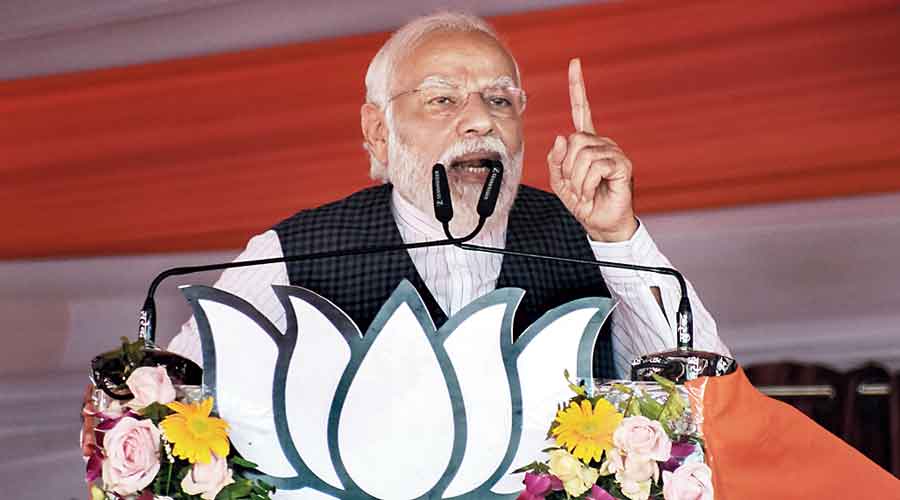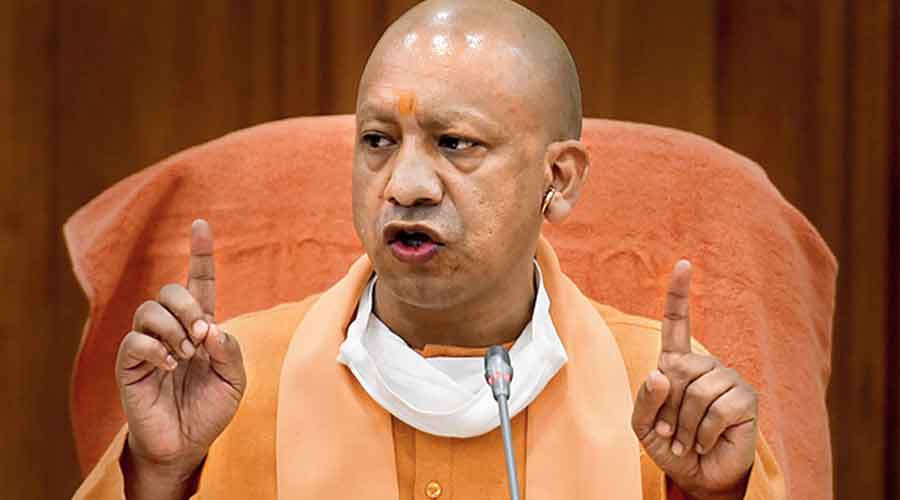Prime Minister Narendra Modi is likely to make his Lok Sabha constituency Varanasi his base for three nights and campaign aggressively for the final two phases of voting in east Uttar Pradesh.
The primary aim is to keep the BJP’s non-Yadav OBC vote base intact and counter the Opposition campaign and public anger against the menace of stray cattle that threatens to upset the ruling party’s calculations, BJP managers said.
Modi is likely to be in Varanasi between March 2 and 5, and campaign in the crucial eastern parts of the sprawling state that account for 111 seats. Polling here is scheduled for the sixth phase on March 3 and the final leg on March 7.
Modi had camped in Varanasi in the last Assembly elections in 2017 as well but this time a major thrust seems necessary from him to offset the losses the BJP may have suffered in the first two rounds of voting in western Uttar Pradesh because of the yearlong farmers’ protest, party leaders said.
“The situation is vastly different from 2017. Then Modiji’s charm had taken us past the 300-mark (in the 403-member Assembly), but this time we need him to ensure that we retain power even if by a reduced margin,” a BJP leader in Varanasi said.
The leader acknowledged that the problem of stray cattle had emerged as a big issue against the Yogi Adityanath government, suggesting that only Modi could help the party tide over it.
Stray cattle have become a headache for the BJP in eastern Uttar Pradesh that has a much larger population of cows compared to the western parts where buffaloes are preferred by farmers.
The Adityanath government’s crackdown on cow slaughter has given rise to armies of stray cattle that have been devouring the crops of farmers, fuelling anger against the incumbent BJP.
Modi has been broaching the topic in his campaign speeches and has promised to come up with a solution after the elections are over, claiming that his government will make the dung of unproductive animals lucrative for the farmers.
The BJP’s performance in east Uttar Pradesh appears to be holding the key for the party since internal assessments have indicated “significant losses” in the first two phases on February 10 and 14 in the western region due to the farmers’ movement that forced Modi to repeal three farm laws.
The farmers’ protest re-forged the political unity of two dominant sections in the west, the Jats and the Muslims, against the BJP, which had earlier gained massively from the sundered ties in the aftermath of the 2013 Muzzafarnagar riots.
The BJP’s managers are banking on Modi’s perceived charisma in the last two phases to emerge unscathed from a closely fought election that is being seen a bellwether for the 2024 Lok Sabha polls, party leaders said.
Post-2014, the non-Yadav OBCs have emerged as a strong vote bank of the BJP. But in this election, a coalition of regional and sub-regional parties championing the cause of various smaller castes and brought together by Samajwadi Party chief Akhilesh Yadav threatens to dent this base.
The smaller parties such as the Om Prakash Rajbhar-led Suheldev Samaj Party, which was an ally of the BJP last time, have now joined hands with the SP. Similarly, a number of other local outfits with influence in different pockets of eastern Uttar Pradesh have aligned with the SP, seeking to revive a Mandal-like backward-versus-forward backlash against the Hindutva pitch of the BJP.
The BJP has also been scarred by the rebellion of two prominent OBC ministers — Swami Prasad Maurya and Dara Singh Chauhan — who quit the party on the eve of the polls to find common cause with Akhilesh. The duo and their supporters, including defector MLAs, have accused chief minister Adityanath of neglecting backwards and Dalits.
In the eastern parts of the state, Modi is being projected by the BJP as an OBC leader, and the party hopes that an aggressive campaign by him will consolidate the support of the backward classes.
Apart from these issues, the party managers hope that Modi’s presence will galvanise BJP leaders and cadres on the ground who appear to be divided and are said to be working against candidates from rival camps.
“Internal rivalry in the state party has intensified under the Yogi government. Many leaders on the ground are trying to sabotage the prospects of official candidates,” another BJP leader in Varanasi said, claiming that during his stay in the city, Modi was likely to hold meetings to get different factions to work as one unit.











